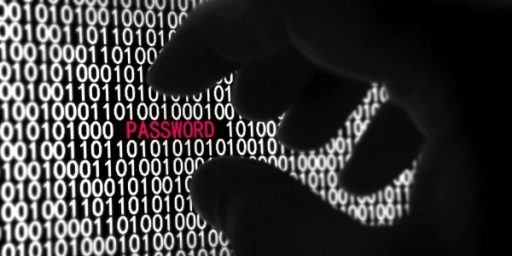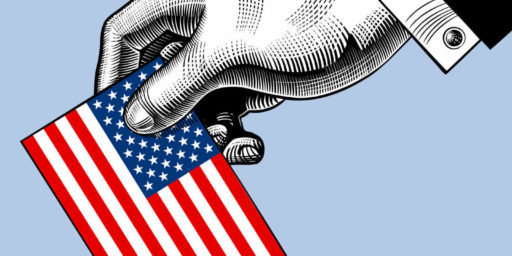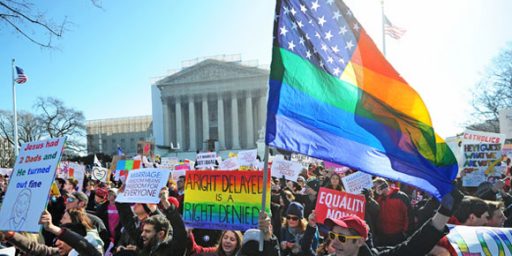States Rigging 2012 Elections?
States are racing to put obstacles in front of voters in the name of fraud prevention.
E.J. Dionne has written an incendiary column titled “How states are rigging the 2012 election.”
An attack on the right to vote is underway across the country through laws designed to make it more difficult to cast a ballot. If this were happening in an emerging democracy, we’d condemn it as election-rigging. But it’s happening here, so there’s barely a whimper.
The laws are being passed in the name of preventing “voter fraud.” But study after studyhas shown that fraud by voters is not a major problem — and is less of a problem than how hard many states make it for people to vote in the first place. Some of the new laws, notably those limiting the number of days for early voting, have little plausible connection to battling fraud.
These statutes are not neutral. Their greatest impact will be to reduce turnout among African Americans, Latinos and the young. It is no accident that these groups were key to Barack Obama’s victory in 2008 — or that the laws in question are being enacted in states where Republicans control state governments.
That Republicans are passing laws that they have long favored is hardly shocking. It’s true that there’s little evidence of voter fraud, at least in the form of people voting twice or showing up claiming to be someone else in order to vote. But it’s also true that there’s real fear of these things and that there’s wide support for making those theoretically easy things harder.
So, what, precisely, is happening?
The laws in question include requiring voter identification cards at the polls, limiting the time of early voting, ending same-day registration and making it difficult for groups to register new voters.
Sometimes the partisan motivation is so clear that if Stephen Colbert reported on what’s transpiring, his audience would assume he was making it up. In Texas, for example, the law allows concealed handgun licenses as identification but not student IDs. And guess what? Nationwide exit polls show that John McCain carried households in which someone owned a gun by 25 percentage points but lost voters in households without a gun by 32 points.
Besides Texas, states that enacted voter ID laws this year include Kansas, Wisconsin, South Carolina and Tennessee. Indiana and Georgia already had such requirements. The Maine Legislature voted to end same-day voter registration. Florida seems determined to go back to the chaos of the 2000 election. It shortened the early voting period, effectively ended the ability of registered voters to correct their address at the polls and imposed onerous restrictions on organized voter-registration drives.
Student IDs are simply an indication of being in school; they don’t signify residency. Indeed, university towns have long taken measures to make it difficult for students to vote, since the massive number of people who are only transient parts of the community can easily overwhelm the resident population at the polls.
Similarly, registration drives sponsored by organizations with a specific political agenda (as opposed to League of Women Voters-type civic groups) raise some red flags. They can yield massive numbers of spur-of-the-moment registrations, often under peer pressure, and are harder to vet that traditional in-person registration which require formal proof of address. But it’s hard to get too excited about them in an era of mail-in registration, which eliminates those safeguards, anyway.
Registration requirements are more problematic. We’re one of the few countries that make registering to vote and voting distinct processes. Having to take the time to get registered used to be an onerous barrier, although Motor Voter more-or-less eliminated the obstacles. And there’s an argument to be made that registration lists ought be set in advance–thus some cut-off is needed; but digital information systems should really eliminate that as an objection.
Are these reforms are aimed at suppressing the black and youth votes? I’d have to see substantially more evidence. But they seem to be aimed at theoretical problems that those who study such things can’t find in the wild.






You left out this retarded line highlighted as genius at Balloon Juice.
Why do I think it is retarded?
Hint concealed handgun licenses are issued by the State Government.
The problem is that these laws allow either side to effectively disqualify votes with spurious challenges. As for rigging, there only battleground states who are doing this are Wisconsin and Florida. Two important states, but two states where the indy/dem voters are fired up to stick it to the GOP because of incompetent governors.
There should be a federal voting standard saying that you can vote in your district/state if you can prove residency inside said district or state. Leaving up to the states is leaving up to the partisan winds.
So a dorm room is not a legal residence? Not in all other aspects of the law?
If it is a legal residence, it makes the effort to strip voting rights from residence a pretty blatant insult to American democracy.
(Cities may not like having 10,000 temporary residents, but I don’t believe they are legally “transients.”)
Dorm rooms aren’t legal residences, otherwise you could claim in state tuition while living in a dorm, which you can’t. Pretty much every state has that ruling at state schools. mpw
Thanks for my morning laugh.
James, have you ever met any of your fellow Republicans?
Let me provide the caveat that I find these laws concerning because the evidence suggests that they tend to affect poor voters and can stop them from voting more than they do anything to prevent voter fraud.
However, I will note in regards to student IDs: there are two key problems:
1) They do not indicate place of residence. Yes, I might live in the dorm, or I might commute from a wholly different electoral jurisdiction.
2) They do not distinguish between US citizens and foreign students.
As such, if you are going to require IDs as proof of eligibility to vote, student IDs aren’t appropriate items for such a goal.
The issue in terms of state tuition is not linked to whether one lives in a “legal residence” or not. If that were the case one could get in-state tuition by simply not living on campus. Typically there are other rules that dictate whether one plays in-state or out-of-state tuition.
In terms of voting, if a student who lives in a dorm wants to register to vote in the city in which their school is located, as opposed to maintaining their registration at their parent’s home, they can do so. They have to choose one, of course.
This is true of anyone, btw, who might have more than one residence. If your main residence is Chicago, but you have a winter home in Arizona, you can register to vote in either place (but only one).
“…there’s little evidence of voter fraud, at least in the form of people voting twice or showing up claiming to be someone else in order to vote. But it’s also true that there’s real fear of these things…”
Theres little evidence of ghosts, goblins, witches, vampires, or hideous monsters hiding under the bed. But it’s also true that there’s real fear of these things.
I do not think that word…real…means what you think it means.
No evidence for any major voter fraud, lots of evidence of registration fraud, though, which is fraud against groups like ACORN.
This isn’t about trying to stop voter fraud, this all about voter suppression. Something that’s alive and well.
Aides To Former Maryland Gov Indicted For Ordering Calls To Suppress Votes.
I overly dislike going out to vote, standing in lines, and generally interacting with people I don’t know and honestly don’t care to know which for a long time kept me from voting at all. Now that I can vote via absentee ballot I vote in every election I can and I’m more aware of what’s going on becuase I spend far more time researching the candidates and the issues.
I do think that some of these laws are intended to suppress groups of people. If it actually works or not is another matter. Also, I don’t have an issue with Photo ID for voting in person. You have to show proof of ID for the smallest things these days and voting is pretty important. Also, I believe that in most states you can get a no or low cost photo ID pretty easily.
On the question of out of state students, I think most of them should be voting in the home districts via absentee ballot and they should always be allowed to do so.The population of Grinnell here generally increases by about 2000 or so in the fall when college is in session.
On the subject of voter fraud/suppression/etc, what’s the legitimate concern about being bused to the polls?
If someone couldn’t be bothered to register to votes, what are the chances they took the time to actually study the candidates and issues involved?
Showing an ID as a requirement to vote = racist, but driving around “urban” neighborhoods with suitcases full of “street money” cash to motivate those same voters = democracy?
Now I get it.
Related: Delaware Rules Keep Students from Voting
The Supreme Court decision referred to here seems to confirm my IANAL legal suspicion, while the moves by the Elections Commissioner seem to confirm my cynical political suspicion.
It’s not an incendiary column. It’s an in-kind campaign donation.
@Steven: In regards to
Totally agree with the argument against Student IDs. Though the first thing that I thought about in terms of concealed carry is must you get CC in multiple states (or can only residents of the specific state have a CC and it applies across all states)?
In terms of the issue of voter suppression, PJ beat me to it, but again look at the recent transcript from Alabama:
PJ
Leaving aside the question of whose paying for the buses, the bigger question becomes how many people that traveled on those buses realistically have access to everything that they need to get a voter ID card?
Put a different way, if the laws requiring the Voter ID cards allowed for organizations to hold “get an ID day” with the necessary government representative present, then I’d have less fear about registrations. Or, in this age of electronics, if the process was largely based on an electronic check rather than possession of certain paper documents, I’d feel more comfortable about it.
Oh, and just for a couple number to think with in terms of “how easy it is to get a Voter ID card.”
In 2009, of the adult population of the US, approximately 68% are registered (I’m assuming that mean licensed) drivers. (cite: http://www.fhwa.dot.gov/policyinformation/statistics/2009/dv1c.cfm)
Same year, 7.7% of Americans did not have bank accounts, and of those 7.7%, more than 20% of them were people who earned *under* $30K. (cite: http://money.cnn.com/2009/12/02/news/economy/fdic_survey/)
Again, these are facts to keep in mind when asking if, intentionally or not, Voter ID acts will disenfranchise certain classes of voters.
@Mattb:
Of course, come to think of it, it is possible to have multiple driver’s licenses, (I would think). If I was a “Snow Bird” with homes in the North and the South, might I have more than one DL? I don’t recall having to surrender my old license when moving across state lines.
All this points to the fact that we have a rather balkanized ID system.
i’m sure limiting the vote (ability to vote early, ability to register/change election information) is not going to hamper democracy! those political elites would never want to limit the ability of the people to vote!
So let me get this right. If there are not many if any means to detect voter fraud now, many of you are claiming it isn’t happening since there haven’t been many cases reported. About like saying if someone is murder in the woods and no one witnesses it, it didn’t happen.
Showing an ID to vote is very reasonable requirement. Anybody who doesn’t vote because of that requirement wither it because they are too lazy or are not qualified shouldn’t be voting anyway.
@Wayne:
On balance, I don’t disagree.
However, the problem then legitimately becomes access to identification. If there is some significant portion of the population lacks an adequate ID then that impedes their voting rights (and therefore a problem that needs rectifying, if we actually value the right to vote as a society).
Careful Steven, you’re stumbling into “National ID Card” scarey land.
/end sarcasm.
And which party is fanning this fear?
That may be the most naive thing I’ve seen you say on this blog.
Apparently taking a bus to vote is undemocratic. Making it extremely difficult for certain classes of voter to vote? Democracy in action!
I don’t really understand why Republicans are always harping on about the Constitution. They don’t understand it, don’t believe in it, and would be very happy if most Americans were not able to vote at all. Scumbags.
“And which party is fanning this fear?”
Exactly. The Republicans, aided by their friends in the media, have claimed this is a significant problem with no evidence to support it. The segment of the population who gets their primary information from conservative media then becomes concerned about this alleged problem. This concern is then used to justify the measures needed to aid Republican candidates.
@Stormy Dragon:
Knowledge about candidates and issues isn’t a requirement for voting.
A fear conveniently ginned up by the same people promoting and passing Voter ID.
The idea that voter fraud is rampant is bunk. Of course it happens in cases, but the cost of prevention is far in excess of the impact – by a HUGE amount. If this was a business they would just write off the losses as insignificant then invest in prevention.
The sad fact it is this probably the only “jobs bills” the Republican’s have proposed as it will create jobs to manufacture and supply the IDs to the millions who have none of the list acceptable ones – of course their databases might be missing a few addresses and postage might be prohibitively expensive to the requester, but that’s just small details the courts can sort out after the elections.
@James
These specific reforms? Maybe. I don’t think it’s a coincidence that the forms of ID tend to favor constituencies that are more likely to vote Republican, and disadvantage groups that are less likely to have a Drivers’ License. But I don’t think that’s because of racism or anti-youth sentiment.
The whole registration system, however, has serious racist and classist roots. It came into effect because southern states wanted a reliable way to disenfranchise black voters, and “progressives” wanted a way to break up the urban “machines” representing poor voters in the cities.
Realistically, the onus should be on the state to have every citizen registered. We also really need to make voting day a federal holiday (or better yet, hold the elections on sunday so more people can show up).
Sadly.
For what its worth, I thank god for this. Expecting people to be informed opens up a whole slew of questions as to who decides what is informed.
In fact, the entire system was in theory set up to allow the ignorant to vote the less ignorant into office and have them make the “big” decisions from a more nuanced perspective. And while that may in part have gone off the rails (in particular with the House — not so much that ignorant people keep getting voted in, but I suspect that many of the framers imagined something far more rotating and with a far lower number of career politicians), it’s still holding up pretty well.
Sometimes what’s far scarier are the voters who “think” they are informed.
Well, photo ID requirements to vote definitely have the effect of disenfranchising key Democrat constituencies; namely, dead people and paid voter fraud operatives. Ergo it’s not surprising that Democrats are all verklempt about them.
Happy to be of help…
Oh, I agree there’s no real good way to make sure only the informed vote. I wasn’t suggesting the state should be filtering people, just noting how sad it is that this is the case.
Of course, on the other hand, I’m not a fan of the state going to ridiculous lengths to encourage people to vote purely for the sake of voting either.
Steven, I wonder if EJ Dionne realizes there is NO CONSTITUTIONAL RIGHT TO VOTE.
@Pete:
It is true that there is no phrase in the constitution that states we have a right to vote. However, it is inherent is the way the Constitution created the House of Representatives and it is clear that there at last some kind of voting was intended from the beginning at the Philadelphia convention.
Further, the amendments cited clearly assume a right to vote (and there is also statute law).
Would it be more appropriate to say we are afforded the “privilege” to vote by the founder’s intent versus a constitutional “right” to vote?
I still have trouble with the assertion that we have a constitutional right based on intent or assumption of supplemental laws.
I do not believe James Joyner is as naive and ignorant as he pretends to be, because no one who pays any attention to American politics or history could possibly have any doubt. that these laws are explicitly intended to discourage and prevent the Democratic Party’s supporters from voting. I am all for assuming good faith in argument, but this fails the laugh test.
@Pete:
No offense, but this is some of the scariest strict constructionism taken to an extreme. It also ignores a number of Amendments (unless by Constitution you mean only the original document and that “supplemental laws” you include the amended bill of rights). Because, for example, the fifteenth Amendment (with us for more than a century now) can be seen as explicitly enshrining the right to vote (at least in Federal Elections) for all US (male) citizens.
Then the 19th Amendment restates the verbage “Right to Vote.” And then it gets restated in the 24th and 26th Amendments:
Granted, these specific “rights” might not have been intended by the founders, but it’s clear that the population of the US at various points in our history *have* seen voting as a right and *have* added it to the Constitution.
Of course this is all at the Federal level, I assume its theoretically possible for states to alter their own constitutions to remove voting for state positions — thought I believe that those same constitutions require that citizens would have to vote on those elections — which I believe triggers the 16th and subsequent “Right to Vote” amendments.
One problem with some of the Voter ID laws is the quantity of documentation required. If you are a married woman, in addition to your birth certificate you can be required to produce your marriage certificate (plural if married more than once) and divorce certificate(s) in order to obtain a State ID card.
When I applied for a passport, I was not required to produce anything other than my birth certificate. I no longer have the other documents (three documents total). Why should the State of SC make it so difficult (and expensive) to register to vote?
@Nell H.,
Exactly. Well put. What’s worse, is that documentation should be, in most cases, digitally available and easily to verify by some other means than having to always have all the physical documents.
Put a different way, if the E-Verify system is “good enough” for determining if someone is eligible to work, shouldn’t it — or a similiar system — be the basis for voting IDs. Granted, there are still big potential problems with this system, *but* I have a hard time seeing why so much effort should be taken to make hiring legal workers as easy as possible (i.e. shifting the majority of work away from the employer), while, at the same time, steps are taken to shift all the work of registering to vote onto the individual.
Good thing we’ll have to wait for quite a few elections in order to collect that “evidence” for you, James.
This entire article is disingenuous. I’m sure the many Republican controlled state legislatures are just “happening” to craft this “theoretical” policy as an “experiment” in controlling national problem of voter fraud which only seems to happen to Republicans. I’m sure gerrymandering and redistricting is also a completely innocent activity whose sole aim is to promote democracy. I was also born falling off a hay truck and think the moon is made of cheese.
Do you honestly think that there is no possible partisan motive for this legislation? Or does that merely go without saying, the “hardly surprised” bit? I too am “hardly surprised” that Republicans favor policies that encourage voter disenfranchisement. That doesn’t make it good policy that requires more “evidence” to see if it works (or doesn’t).
Hmmm. People of faith exercising their right, as Americans, to vote, Not sure I am seeing a problem here.
Ahh. Now I see…